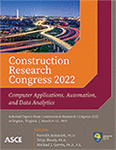COVID-19: Understanding Construction Industry Responses on Twitter in the Emergence of Novel Coronavirus
Publication: Construction Research Congress 2022
ABSTRACT
COVID-19 has spread rampantly in 2020 and people in different countries experienced unprecedented challenges to respond immediately. It has deeply shaken different industries and the overall economy. Many businesses were closed during this disease outbreak, but the construction industry continued to operate while others struggled. As the pandemic spread, the intensity of social media interactions dramatically increased as people started maintaining physical distances and staying at home. Recent studies have shown that social media serves the purpose of disseminating information in major crises and such social interactions correlate with what happens in the real world. Unlike traditional media, social media data also offered sufficient statistical power to understand risk communication patterns. The construction industry adopted innovative strategies to continue its operations and activities while responding to a number of concerns associated with health risks of the workers on site. This study aims at identifying the emerging communication patterns of construction stakeholders on social media (Twitter) during COVID-19. Around 12 million tweets were collected in the early days of the ongoing pandemic (March, April, and May 2020) by Twitter Application Programming Interface (API), in the region of North America; then filtered this data based on keywords pertaining to COVID-19 and construction activities. Such information was processed by applying several machine learning and natural language processing techniques. The spatiotemporal patterns of construction risk communication revealed in this study would support policymakers, businesses, and other industries to take more efficient measures and be more resilient both in the current and future pandemics.
Get full access to this article
View all available purchase options and get full access to this chapter.
REFERENCES
Ahmed, M. A., Sadri, A. M., and Amini, M. H. (2020). “Data-driven Inferences of Agency-level Risk and Response Communication on COVID-19 through Social Media based Interactions.”.
Ahmed, M. A., Sadri, A. M., Pradhananga, P., Elzomor, M., and Pradhananga, N. (2020). “Social Media Communication Patterns of Construction Industry in Major Disasters.” Construction Research Congress Proceedings-2020.
Bagheri, H., and Islam, M. J. (2017). “Sentiment analysis of twitter data.”.
Broniatowski, D. A., Kerchner, D., Farooq, F., Huang, X., Jamison, A. M., Dredze, M., and Quinn, S. C. (2020). “The covid-19 social media infodemic reflects uncertainty and state-sponsored propaganda.”, 3(2).
Camargo, K. R. D., Jr. (2020). “Trying to make sense out of chaos: science, politics and the COVID-19 pandemic.” Cadernos de saude publica, 36, e00088120.
Castillo, C., Mendoza, M., and Poblete, B. “Information credibility on twitter.” Proc., Proceedings of the 20th international conference on World wide web, 675–684.
CBO, C. B. O. (2020). “COVID-19 in Construction: Crucial Developments & Updates.” <https://www.constructionbusinessowner.com/covid19inconstruction>.
De Ceukelaire, W., and Bodini, C. (2020). “We need strong public health care to contain the global corona pandemic.” International Journal of Health Services, 50(3), 276–277.
Gros, C., Valenti, R., Schneider, L., Valenti, K., and Gros, D. (2020). “Containment efficiency and control strategies for the Corona pandemic costs. Cornell University.”
Haleem, A., Javaid, M., and Vaishya, R. (2020). “Effects of COVID 19 pandemic in daily life.” Current medicine research and practice.
Knight, H. A. (2020). “A Look at COVID-19 Impacts on the Construction Industry.” <https://www.hklaw.com/en/insights/publications/2020/05/a-look-at-covid19-impacts-on-the-construction-industry>.
Mojumder, M. N., Ahmed, M. A., and Sadri, A. M. (2021). “Identifying Ridesharing Risk, Response, and Challenges in the Emergence of Novel Coronavirus Using Interactions in Uber Drivers Forum.” Frontiers in Built Environment, 7.
Sadri, A. M., Hasan, S., Ukkusuri, S. V., and Cebrian, M. (2018). “Crisis communication patterns in social media during Hurricane Sandy.” Transportation research record, 2672(1), 125–137.
Sapul, M. S. C., Aung, T. H., and Jiamthapthaksin, R. “Trending topic discovery of Twitter Tweets using clustering and topic modeling algorithms.” Proc., 2017 14th International Joint Conference on Computer Science and Software Engineering (JCSSE), IEEE, 1–6.
Singh, L., Bansal, S., Bode, L., Budak, C., Chi, G., Kawintiranon, K., Padden, C., Vanarsdall, R., Vraga, E., and Wang, Y. (2020). “A first look at COVID-19 information and misinformation sharing on Twitter.”.
Worldometer. (2020). “COVID-19 Coronavirus Pandemic data.” https://www.worldometers.info/coronavirus/country/us/.
Information & Authors
Information
Published In
History
Published online: Mar 7, 2022
Authors
Metrics & Citations
Metrics
Citations
Download citation
If you have the appropriate software installed, you can download article citation data to the citation manager of your choice. Simply select your manager software from the list below and click Download.
